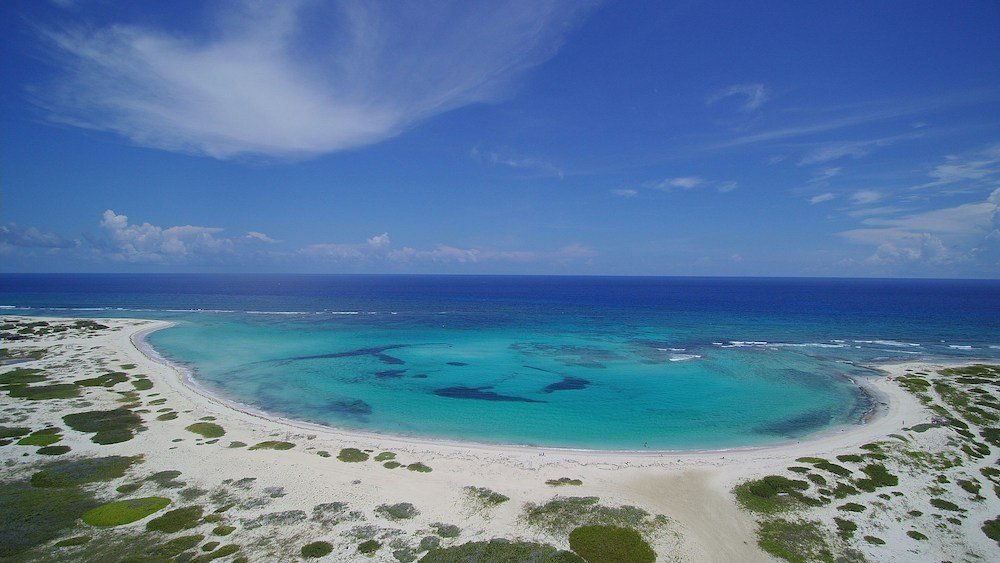
Nestled in the crystal-clear waters of the southern Caribbean Sea, just off the coast of Venezuela, the ABC Islands are a trio comprised of Aruba, Bonaire, and Curacao—stand as beacons of beauty, culture, and history.
These islands, though geographically close, each offer a unique blend of natural wonders, vibrant cultures, and rich histories that make them standout destinations within the Caribbean region.
The allure of the ABC Islands extends beyond their sun-soaked shores and into the hearts of travelers seeking adventures that combine relaxation with rich cultural experiences.
The ABC Islands form part of the Lesser Antilles, with each island boasting its own distinct identity.
Aruba, known for its arid climate and stunning beaches, offers a lively tourist scene with luxury resorts, casinos, and a vibrant nightlife.
Bonaire is a haven for nature lovers and scuba diving enthusiasts, renowned for its commitment to environmental preservation and spectacular marine life.
Curacao, with its colorful Dutch colonial architecture and multicultural community, offers a rich cultural tapestry and a deep historical significance.
Together, these islands create a mosaic of experiences that cater to a wide array of interests and preferences.
The ABC Islands hold significant importance in the Caribbean for several reasons.
Economically, they are pivotal due to their strategic locations, thriving tourism industries, and, in Curacao and Aruba’s case, their oil refineries.
Culturally, they serve as melting pots of Dutch, African, and indigenous influences, offering unique linguistic, culinary, and artistic landscapes.
Environmentally, their efforts in conservation and sustainable tourism set benchmarks for other Caribbean destinations.
The islands’ blend of economic vitality, cultural richness, and environmental consciousness underscores their critical role in the Caribbean’s socio-economic and cultural fabric.
This article will delve deep into the heart of the ABC Islands, exploring their geographical splendor, historical journeys, cultural vibrancies, and much more.
We will uncover the unique attractions that make each island a treasure trove for visitors, from Aruba’s pristine beaches and Bonaire’s world-class diving spots to Curacao’s historical landmarks.
Furthermore, we will highlight the islands’ economic landscapes, environmental conservation efforts, and provide invaluable travel tips for those planning to visit.
Geographical Overview

The ABC Islands, an enchanting trio in the Caribbean, boast unique landscapes and climates that distinguish them not only from each other but also from the rest of the Caribbean region.
This section explores the location, physical characteristics, climate, and unique geographical features of Aruba, Bonaire, and Curacao, offering insights into what makes these islands truly special.
Location in the Caribbean
Situated just north of Venezuela’s coast in the southern Caribbean Sea, the ABC Islands (Aruba, Bonaire, and Curacao) lie outside the hurricane belt, which gives them a distinct advantage in terms of weather stability and year-round tourism appeal.
This strategic location contributes to their popularity as destinations that offer warm, sunny weather almost every day of the year.
Physical Characteristics and Climate of Each Island
Aruba is characterized by its dry, desert-like landscape dotted with cacti and aloe vera plants, contrasting sharply with the turquoise waters of its beaches. The island enjoys a consistently warm climate with minimal rainfall, making it a perfect getaway for sun-seekers and beach enthusiasts.
Bonaire presents a flat, arid topography similar to Aruba but is renowned for its pioneering role in marine conservation. The island’s climate is dry and sunny, which has contributed to the flourishing of its salt pans and the preservation of its unique coral reef ecosystems, accessible right from the shore.
Curacao offers a more varied landscape, with its hilly terrain, thriving flora, and sheltered bays. The island experiences a hot and dry climate but benefits from slightly more rainfall than its neighbors, allowing for a more lush environment in certain areas. Curacao’s weather and geographic diversity make it an attractive destination for a range of outdoor activities.
Unique Geographical Features
Each island boasts unique features that contribute to their allure:
- Aruba’s northwest coast is home to the iconic Divi-Divi trees, naturally bent at 90 degrees due to the constant trade winds, creating an unforgettable landscape against the backdrop of its white sandy beaches.
- Bonaire is world-famous for its easily accessible marine biodiversity. The Bonaire National Marine Park, encircling the entire island, offers some of the best snorkeling and diving experiences in the Caribbean, thanks to the island’s commitment to environmental preservation.
- Curacao’s Christoffel Park and the Curacao Underwater Marine Park highlight the island’s diverse landscapes, from rugged mountains to protected coral reefs. Additionally, the island’s capital, Willemstad, with its brightly colored Dutch colonial architecture, is a UNESCO World Heritage site that adds to the island’s unique geographical and cultural landscape.
Historical Context
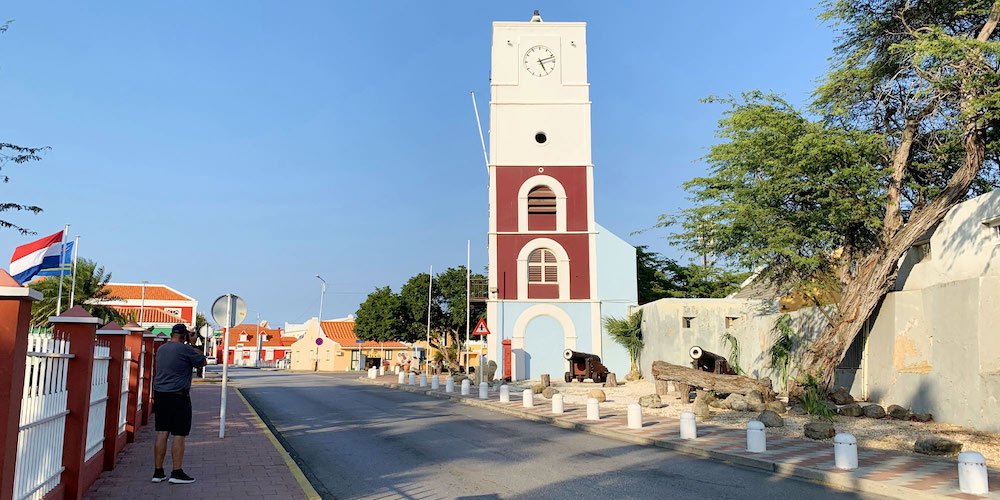
The rich tapestry of the ABC Islands’ history stretches from the pre-colonial era through centuries of European colonization to their current political status, offering a fascinating glimpse into the forces that have shaped these islands.
Understanding the historical context of Aruba, Bonaire, and Curacao reveals the depth of their cultural heritage and provides insight into their modern identity.
Pre-Colonial History and Indigenous Populations
Long before European explorers set foot on their shores, the ABC Islands were inhabited by the Arawak-speaking Caquetío people, a branch of the Arawak Indians from the South American mainland.
These indigenous populations were skilled fishermen and farmers, navigating the challenges of the islands’ arid landscapes.
Artifacts and petroglyphs found across the islands today offer a silent testimony to their presence and way of life.
European Discovery and Colonial History
The fate of the ABC Islands took a dramatic turn with the arrival of the Spanish in the early 16th century.
Alonso de Ojeda, a lieutenant of Christopher Columbus, claimed the islands for Spain in 1499, marking the beginning of European influence.
The Spanish deemed the islands of little economic value and forcibly relocated much of the indigenous population to work in the mines of Hispaniola.
In the 17th century, the Dutch, recognizing the strategic importance of the islands in the salt trade and as a naval base, captured them from the Spanish.
The islands became entwined in the global networks of trade, slavery, and conflict that characterized the colonial era.
Transition to Modern Times and Current Political Status
The abolition of slavery in the 19th century led to significant social and economic changes on the islands.
In the 20th century, the discovery of oil off the coast of Venezuela transformed Curacao and Aruba into bustling centers for oil refining.
This economic boon, however, did not fully extend to Bonaire, which remained more reliant on salt production and later, eco-tourism.
Today, the ABC Islands are part of the Kingdom of the Netherlands, with varying degrees of autonomy.
Aruba became a separate entity within the Kingdom in 1986, followed by Curacao and Bonaire in 2010, when the Netherlands Antilles was dissolved.
While they maintain close ties to the Netherlands, these islands have their own distinct identities and governance structures, reflecting their unique historical trajectories and cultural landscapes.
Cultural Insights
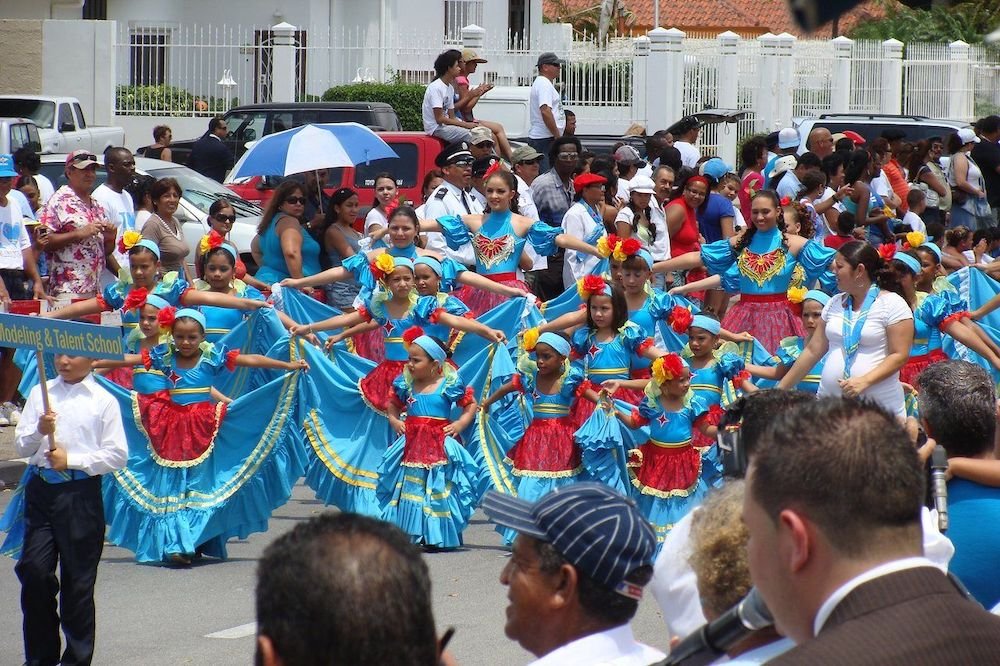
The cultural landscape of the ABC Islands is as diverse and colorful as the coral reefs that surround them.
A melting pot of Dutch, African, and indigenous influences, these islands celebrate a unique cultural identity that is reflected in their languages, traditions, festivals, and everyday life.
This rich cultural blend offers visitors a unique experience, combining the warmth of Caribbean hospitality with European history and African vibrancy.
Overview of the Cultural Blend on the Islands
The ABC Islands’ culture is a vibrant tapestry woven from the threads of its diverse historical influences.
Dutch colonial history has left a visible imprint on the islands’ architecture, legal systems, and educational structures.
African heritage, brought to the islands through the transatlantic slave trade, is deeply embedded in the music, dance, cuisine, and religious practices.
Indigenous traditions, though more subtle, can still be found in the islands’ art, food, and community events.
This interweaving of cultures has fostered a society that is open, multicultural, and rich in traditions.
Languages Spoken
The linguistic landscape of the ABC Islands is as diverse as its people.
Papiamento, a creole language that blends African, Spanish, Portuguese, Dutch, French, and Arawak Indian languages, is the most widely spoken language, serving as a symbol of the islands’ multicultural identity.
Dutch is the official language and is used primarily in government, legal matters, and education.
English and Spanish are also widely spoken, reflecting the islands’ international ties and tourism-driven economy.
Local Traditions and Festivals
The ABC Islands come alive with a calendar full of festivals and traditions that celebrate their rich cultural heritage.
Carnival, a festival with roots in both European and African traditions, is perhaps the most vibrant and anticipated event.
It features colorful parades, elaborate costumes, and lively music, drawing participants and spectators from around the world.
Other significant cultural events include Dia di San Juan (St. John’s Day), celebrating the island’s African heritage with traditional dances and music, and the Dutch-inspired Sinterklaas (St. Nicholas Day) in December.
Influence of Dutch, African, and Indigenous Cultures
The Dutch influence is most evident in the islands’ historic buildings, forts, and museums, as well as in the legal and educational systems.
African influences permeate the islands’ music, dance, and cuisine, with dishes like keshi yená (stuffed cheese) and music styles such as tumba resonating with African rhythms.
Indigenous contributions, while more understated, are celebrated through local art and annual heritage events that pay homage to the islands’ first inhabitants.
Economic Overview

The ABC Islands, with their strategic location in the southern Caribbean, play a significant role in the regional economy.
Their economies are diverse, ranging from tourism to oil refining, aloe export, and salt production.
These industries not only contribute to the islands’ GDP but also provide employment opportunities and support local communities.
Economic Significance in the Caribbean
The ABC Islands are considered economic powerhouses in the Caribbean, thanks to their developed infrastructure, strategic ports, and robust industries.
Their economic activities not only serve the local populations but also have wider implications for trade, tourism, and investment in the Caribbean region.
The islands’ economic models, characterized by innovation and sustainability, offer valuable lessons for other Caribbean nations aiming to diversify their economies.
Key Industries
Tourism is the backbone of the economy for all three islands, attracting visitors from around the world with their pristine beaches, vibrant cultures, and rich histories. The tourism industry supports a wide range of businesses, from hotels and restaurants to tour operators and local artisans.
Oil refining has historically been a critical industry for Curacao and, to a lesser extent, Aruba. These islands have leveraged their proximity to Venezuelan oil fields to develop large refining complexes. Although the importance of oil refining has fluctuated due to global oil prices and political challenges, it remains a significant part of their economies.
Aloe export is a notable industry in Aruba, home to some of the world’s oldest Aloe Vera plantations. The island’s arid climate is ideal for growing aloe, and products derived from this versatile plant are exported globally.
Salt production has been a cornerstone of Bonaire’s economy for centuries. The island’s expansive salt flats, where seawater is naturally evaporated to leave behind high-quality salt, are not only a source of economic activity but also a habitat for wildlife, including the iconic pink flamingos.
Impact of Tourism on the Economy
Tourism’s impact on the ABC Islands’ economy cannot be overstated. It is the primary source of revenue, driving growth in other sectors such as retail, construction, and services.
The influx of tourists supports local employment and fosters the development of small and medium-sized enterprises.
However, the dependence on tourism also makes the islands vulnerable to global economic downturns and challenges such as climate change.
Consequently, there is a growing emphasis on sustainable tourism practices to ensure that the industry remains a reliable pillar of the economy for generations to come.
Tourist Attractions
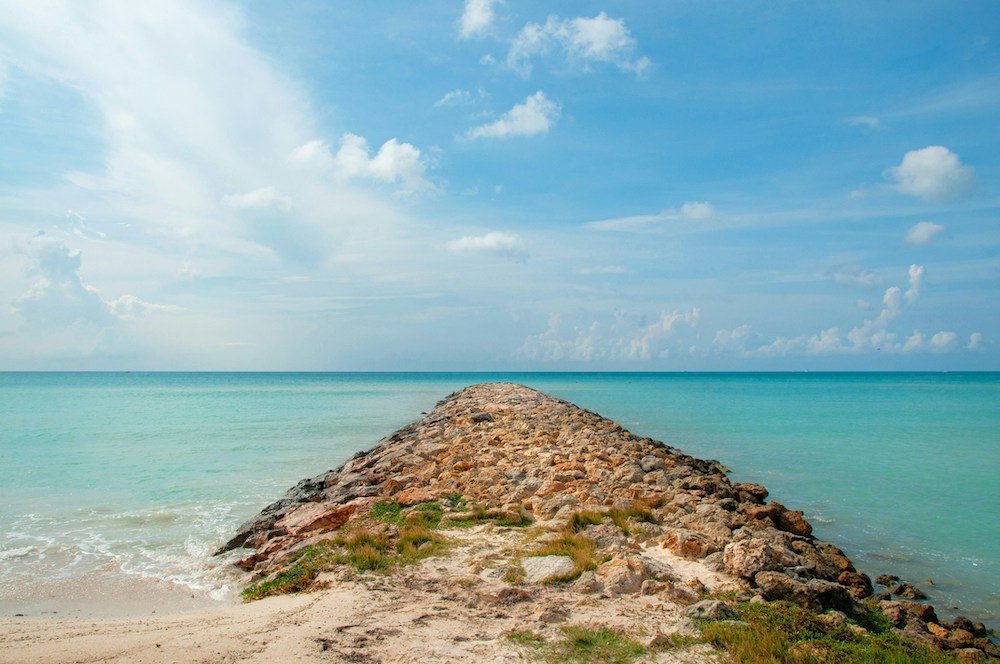
The ABC Islands are a paradise for visitors, offering a blend of stunning natural beauty, rich historical sites, unique activities, and a culinary scene that reflects their multicultural heritage.
Each island boasts its own set of attractions, making them must-visit destinations for travelers seeking a diverse Caribbean experience.
Top Beaches and Natural Attractions on Each Island
Aruba is famed for its powdery white-sand beaches, such as Eagle Beach and Palm Beach, which offer idyllic settings for relaxation and water sports. The island’s rugged interior features Arikok National Park, a protected area that showcases Aruba’s diverse natural landscapes, including desert-like terrain, unique rock formations, and indigenous flora and fauna.
Bonaire is renowned for its marine biodiversity and is a premier destination for snorkeling and scuba diving. The Bonaire National Marine Park encompasses the island’s entire coastline, providing protected waters teeming with coral reefs and colorful marine life. On land, Washington Slagbaai National Park offers visitors a glimpse into Bonaire’s natural beauty, with opportunities for hiking, bird watching, and exploring historical sites.
Curacao offers a mix of natural and cultural attractions, with stunning beaches like Playa Kenepa and Cas Abao perfect for swimming and snorkeling. The Christoffel National Park is a highlight, offering hiking trails, mountain biking, and the chance to spot endemic wildlife. The Hato Caves, with their impressive limestone formations and ancient cave drawings, provide a fascinating look into the island’s geological and cultural history.
Historical Sites and Museums
The ABC Islands are rich in history, with each island home to well-preserved colonial architecture, forts, and museums.
In Aruba, Fort Zoutman and the Historical Museum offer insights into the island’s colonial past.
Bonaire‘s Rincon area and the Salt Pan houses trace the island’s history of salt production and slavery.
Curacao‘s capital, Willemstad, is a UNESCO World Heritage site, where the Kura Hulanda Museum and the Maritime Museum highlight the island’s African heritage and maritime history.
Unique Activities and Experiences
Each island offers unique experiences that reflect its natural environment and cultural heritage. Diving in Bonaire is unparalleled, with accessible shore dives and protected reefs.
Curacao’s Carnival is one of the most vibrant in the Caribbean, showcasing the island’s multicultural community through music, dance, and parades.
Aruba’s Arikok National Park provides opportunities for adventure, from exploring caves to off-roading through dramatic landscapes.
Culinary Scene and Local Specialties
The ABC Islands’ culinary scenes are as diverse as their cultures. Aruba’s restaurants serve a mix of Caribbean, Dutch, and international cuisines, with local specialties like Keshi Yena.
Bonaire’s dining scene reflects its maritime heritage, with fresh seafood dishes and local goat stew being favorites.
Curacao’s blend of African, Dutch, and Latin influences is evident in its culinary offerings, with dishes such as stewed iguana and the iconic Blue Curacao liqueur.
Environmental Conservation
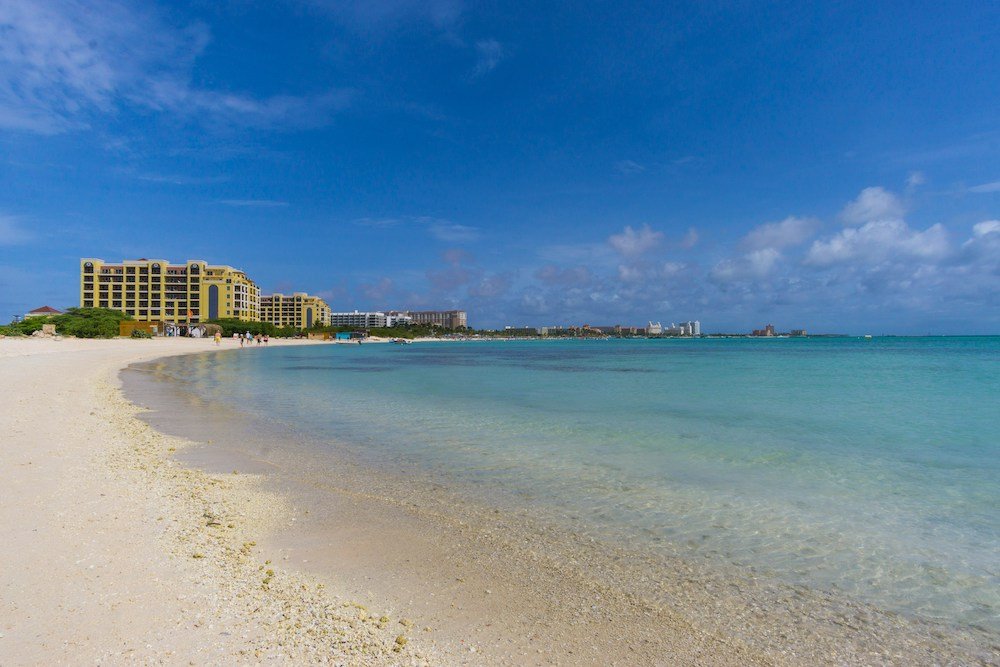
The ABC Islands are not only renowned for their stunning landscapes and rich biodiversity but also for their proactive efforts in environmental conservation.
These islands have implemented various initiatives to preserve their marine life and ecosystems, established numerous protected areas and national parks, and embraced sustainable tourism practices to ensure their natural treasures endure for future generations.
Efforts in Preserving Marine Life and Ecosystems
The conservation of marine life is a cornerstone of environmental efforts on the ABC Islands, particularly in Bonaire, known globally for its pioneering role in marine conservation.
The Bonaire National Marine Park, established in 1979, was one of the first of its kind, protecting a complete coral reef ecosystem.
Similarly, Curacao and Aruba have established marine parks and protected underwater areas to safeguard their diverse marine species and coral reefs from overfishing, pollution, and the impacts of climate change.
Protected Areas and National Parks
Each of the ABC Islands has designated protected areas and national parks to conserve their unique landscapes and biodiversity:
- Arikok National Park in Aruba covers nearly 20% of the island, protecting a range of habitats, from coastal dunes to cactus-strewn landscapes. It’s home to indigenous species such as the Aruban burrowing owl and the Aruban whiptail lizard.
- Washington Slagbaai National Park in Bonaire is a sanctuary for numerous bird species, including flamingos, parrots, and frigate birds. The park’s conservation efforts are crucial for maintaining the island’s status as a birdwatching paradise.
- Christoffel Park in Curacao is the largest national park of the island, offering a diverse array of flora and fauna, including the rare Curacao white-tailed deer, alongside efforts to preserve the island’s unique xerophytic vegetation.
Sustainable Tourism Practices
The ABC Islands recognize the importance of sustainable tourism in preserving their environmental and cultural assets.
They have implemented various practices to minimize the ecological footprint of tourism, including:
- Encouraging eco-friendly accommodations and green certifications for hotels and resorts.
- Promoting responsible diving and snorkeling practices to protect coral reefs.
- Developing eco-tours and nature experiences that emphasize conservation and support local communities.
- Implementing policies to reduce plastic use and enhance recycling efforts across the islands.
Travel Tips and Planning
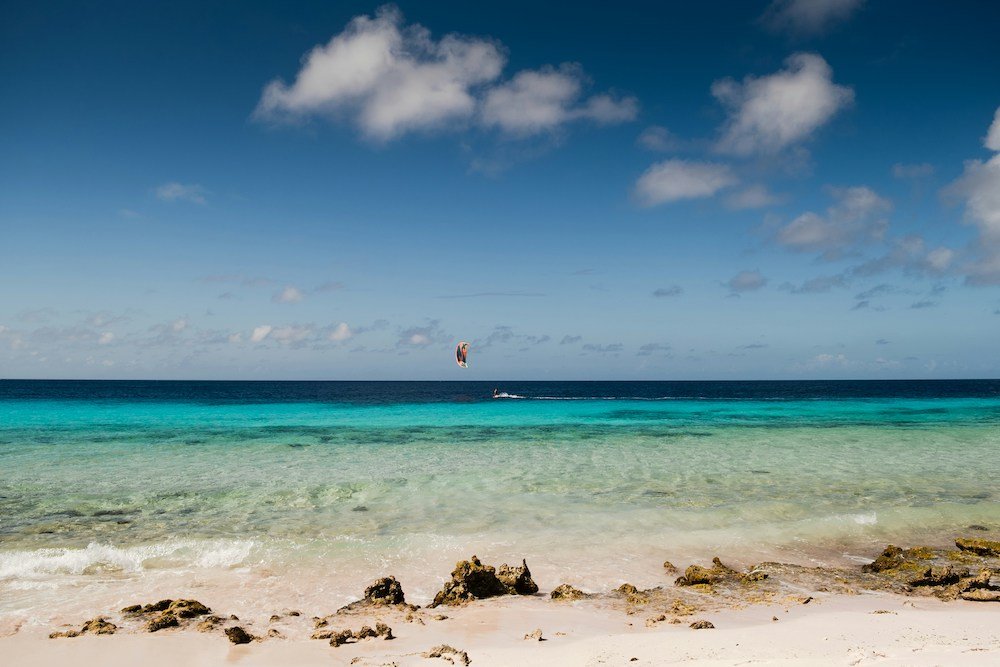
Planning a trip to the ABC Islands is an exciting prospect, promising a blend of beautiful beaches, vibrant cultures, and unforgettable experiences.
To make the most of your visit, consider these essential travel tips, covering the best time to visit, entry requirements, accommodation options, and advice on sustainable and responsible tourism.
Best Time to Visit the ABC Islands
The ABC Islands enjoy a warm, sunny climate year-round, making them a fantastic destination at any time.
However, the best time to visit is from April to August, when the weather is slightly cooler, and the islands are less crowded than the peak winter months.
This period offers the perfect balance of pleasant weather and the opportunity to explore the islands without the peak season crowds.
Entry Requirements and Transportation
Travelers to the ABC Islands should check the latest entry requirements before planning their trip.
Generally, a valid passport is required for entry. Depending on your country of origin, you may also need a visa or a tourist card.
Once on the islands, getting around is easy, with options ranging from rental cars and scooters to buses and taxis.
Each island also offers unique transportation experiences, like the iconic colorful buses of Curacao.
Accommodation Options
The ABC Islands offer a wide range of accommodation options to suit every preference and budget:
- Luxury Resorts: For those seeking indulgence, the islands boast several high-end resorts offering exceptional amenities, beachfront locations, and world-class service.
- Boutique Hotels: Ideal for travelers looking for a personalized experience, boutique hotels on the islands often reflect the local culture and history in their decor and hospitality.
- Vacation Rentals: For families or groups wanting more space and privacy, vacation rentals are a popular choice, providing the comforts of home in paradise settings.
- Local Guesthouses: Experiencing true island hospitality is possible by staying in a local guesthouse, offering a more intimate and authentic insight into island life.
Tips for Sustainable and Responsible Tourism
The ABC Islands are committed to preserving their natural and cultural heritage through sustainable tourism practices. Visitors can contribute by:
- Supporting local businesses and artisans to help sustain the local economy.
- Respecting wildlife and natural habitats, especially when snorkeling, diving, or visiting national parks.
- Choosing eco-friendly accommodations and tours that prioritize environmental conservation.
- Reducing plastic usage by carrying reusable water bottles, bags, and other sustainable travel essentials.
The Future of the ABC Islands
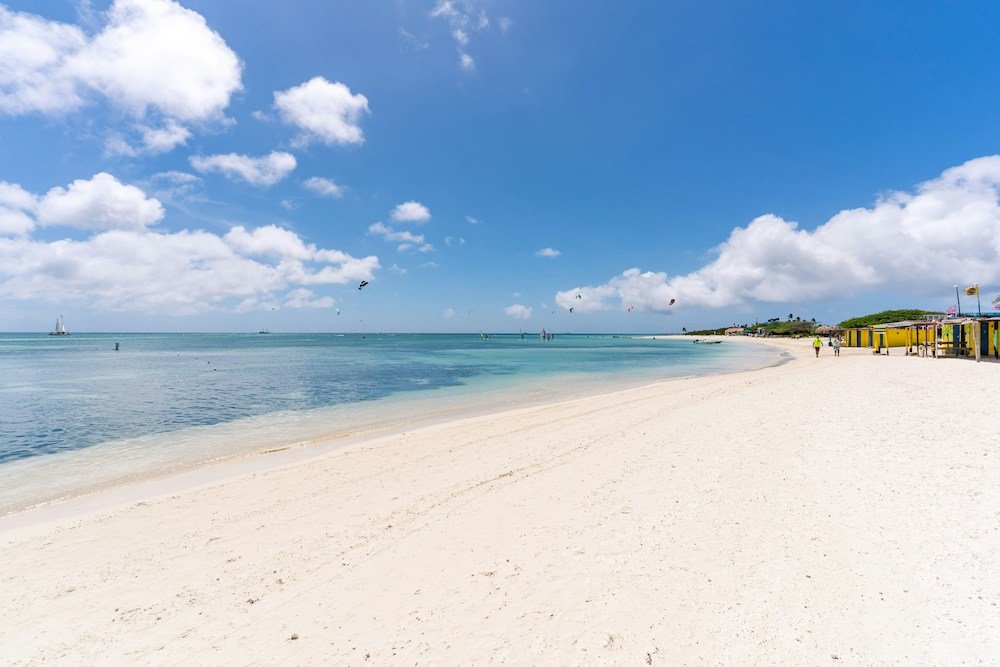
The ABC Islands, with their unique blend of cultural heritage, natural beauty, and economic resilience, face the future with both challenges and opportunities.
As they navigate the complexities of climate change, economic diversification, and the evolving landscape of the tourism industry, the islands are poised to adapt and thrive.
This section explores the hurdles and prospects ahead, offering a glimpse into what the future may hold for Aruba, Bonaire, and Curacao.
Challenges Facing the Islands
Climate Change: As island nations, the ABC Islands are on the frontline of climate change impacts, facing rising sea levels, coral bleaching, and the increasing intensity of tropical storms. These environmental changes pose significant threats to their ecosystems, water resources, and the very infrastructure that supports their economies and communities.
Economic Diversification: Historically reliant on tourism and, to a lesser extent, oil refining and offshore banking, the ABC Islands recognize the need for economic diversification. Expanding into sectors such as renewable energy, information technology, and sustainable agriculture is essential to reduce their vulnerability to external economic shocks and environmental challenges.
Opportunities for Growth and Development
Renewable Energy Initiatives: The islands’ geographical location and climate conditions present substantial opportunities for renewable energy development, particularly in solar and wind energy. Investing in renewable energy can reduce dependence on imported fossil fuels, lower energy costs, and contribute to global efforts against climate change.
Eco-Tourism and Sustainable Development: There is growing interest in eco-tourism, with travelers increasingly seeking authentic and environmentally responsible experiences. The ABC Islands are well-positioned to capitalize on this trend by promoting their natural parks, conservation efforts, and cultural heritage as part of a sustainable tourism model.
Prospects for the Tourism Industry
The tourism industry, the economic lifeline of the ABC Islands, is set to evolve in response to global travel trends and preferences.
The demand for responsible travel, coupled with the islands’ initiatives in sustainable tourism, places them at an advantage to attract a new generation of conscious travelers.
Furthermore, enhancing digital connectivity and marketing can open new markets and opportunities for growth.
The future of the ABC Islands in the tourism sector also lies in balancing growth with sustainability.
Implementing policies that protect their natural environments, preserve their cultural identities, and ensure the benefits of tourism are widely distributed across their communities will be crucial.
Conclusion
Throughout this exploration of the ABC Islands, we’ve traversed their rich tapestry of history, culture, and natural beauty, uncovering the distinct characteristics and shared attributes that make Aruba, Bonaire, and Curacao unique gems in the Caribbean.
From their geographical wonders and historical narratives to their vibrant cultural scenes and efforts in environmental conservation, the ABC Islands offer a kaleidoscope of experiences for every traveler.
We delved into the islands’ economic landscapes, highlighting the pivotal roles of tourism, oil refining, aloe export, and salt production.
We celebrated their tourist attractions, from pristine beaches and natural parks to historical sites and festivals that showcase their rich heritage and lively community spirit.
Moreover, we acknowledged the challenges they face, particularly regarding climate change and economic diversification, while also recognizing the promising opportunities for sustainable growth and development.
The ABC Islands stand out not only for their sun-drenched shores and azure waters but also for their resilience, diverse cultures, and commitment to preserving their environment.
Their unique blend of Dutch, African, and indigenous influences, coupled with their innovative approaches to sustainability, makes them more than just destinations; they are communities with rich histories and bright futures.
Whether you’re drawn by the allure of adventure, the call of unspoiled nature, or the warmth of multicultural societies, the ABC Islands beckon with open arms.
We invite you to explore these islands, not just as tourists, but as guests eager to immerse in their traditions, respect their environments, and contribute to their sustainable future.
Plan your visit, dive into their histories, savor their cuisines, and discover the myriad reasons why the ABC Islands are treasures of the Caribbean.
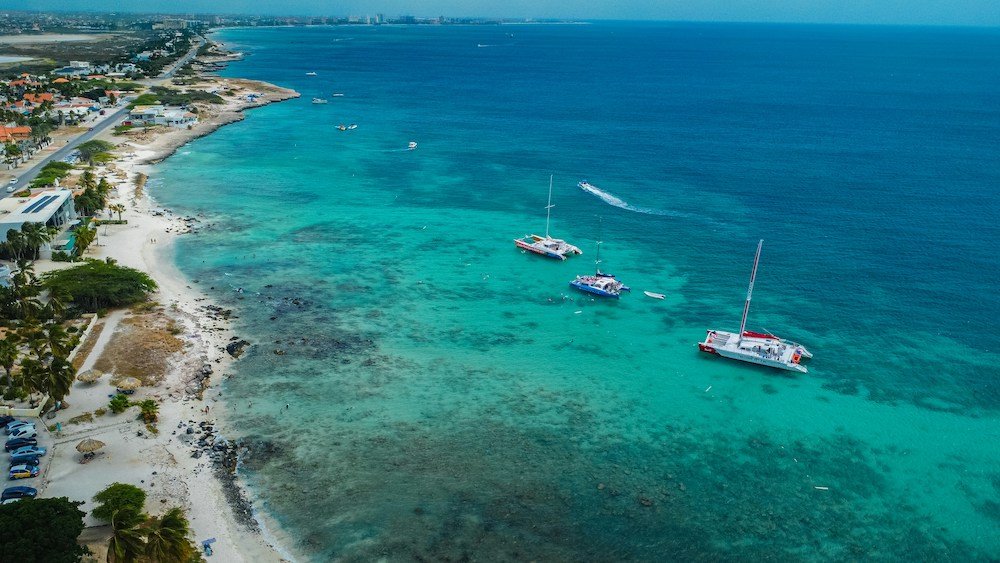
FAQ’s About the ABC Islands:
Which of the ABC Islands is best?
Determining which of the ABC Islands is “best” depends heavily on what you’re looking for in a vacation.
Aruba is renowned for its vibrant nightlife, luxurious resorts, and stunning beaches.
Bonaire is a diver’s paradise, famous for its commitment to environmental preservation and spectacular marine life.
Curaçao offers a rich cultural experience with its diverse history, colorful architecture, and lively festivals.
The best island is the one that aligns most closely with your interests and what you want to get out of your trip.
Which is better Aruba, Bonaire, or Curaçao?
Comparing Aruba, Bonaire, and Curaçao is like comparing apples, oranges, and pears—they’re all delicious but in different ways.
If you’re after a holiday filled with beach lounging, water sports, and nightlife, Aruba might be for you. If diving, snorkeling, and nature are your priorities, Bonaire could be the better choice.
For those interested in culture, history, and a bit of everything, Curaçao could be the ideal destination.
It really comes down to personal preference.
Which of the ABC Islands is cheapest?
Generally, Bonaire is considered the most budget-friendly of the ABC Islands, especially for accommodations and dining.
However, this can vary based on the time of year, current travel trends, and individual travel choices.
Bonaire tends to have fewer luxury resorts than Aruba and Curaçao, which can make it more affordable for travelers.
Who are the ABC Islands owned by?
The ABC Islands are part of the Kingdom of the Netherlands.
Aruba and Curaçao are autonomous countries within the Kingdom, each with their own government.
Bonaire is a special municipality of the Netherlands, directly governed by Dutch law. Despite their political differences, all three islands maintain close ties with the Netherlands.
Is Bonaire safer than Curacao?
Both Bonaire and Curaçao generally offer a safe environment for tourists.
However, like any travel destination, it’s important to take common-sense safety precautions.
Bonaire, being smaller and less populated, might be perceived as safer, especially in terms of petty crimes.
Curaçao has more urban areas where travelers should be more vigilant, but overall, it still boasts a relatively low crime rate compared to other Caribbean destinations.
Is Aruba or Curacao cheaper?
Aruba tends to be more expensive due to its popularity as a tourist destination, especially when it comes to accommodation and dining.
Curaçao offers more in terms of budget-friendly options, from accommodations to activities.
However, prices can vary widely depending on the area of the island, the season, and the type of travel experience you are seeking.
What is the most expensive island to go to?
Of the ABC Islands, Aruba is often considered the most expensive, primarily due to its developed tourism industry, high-end resorts, and upscale dining options.
Its popularity with cruise ships and international travelers also contributes to higher prices compared to Bonaire and Curaçao.
Is it easy to travel between the ABC Islands?
Traveling between the ABC Islands is relatively easy, with regular flights connecting Aruba, Bonaire, and Curaçao.
The flight times are short, usually around 15 to 30 minutes.
While there isn’t a ferry service connecting all three islands directly, the close proximity and frequent flights make island hopping a viable option for travelers.
Is there ferry service between the ABC Islands?
Currently, there is no regular ferry service connecting the ABC Islands.
The most common way to travel between them is by taking one of the frequent short-haul flights offered by regional airlines.
These flights provide a quick and convenient way to explore the islands during your trip.
